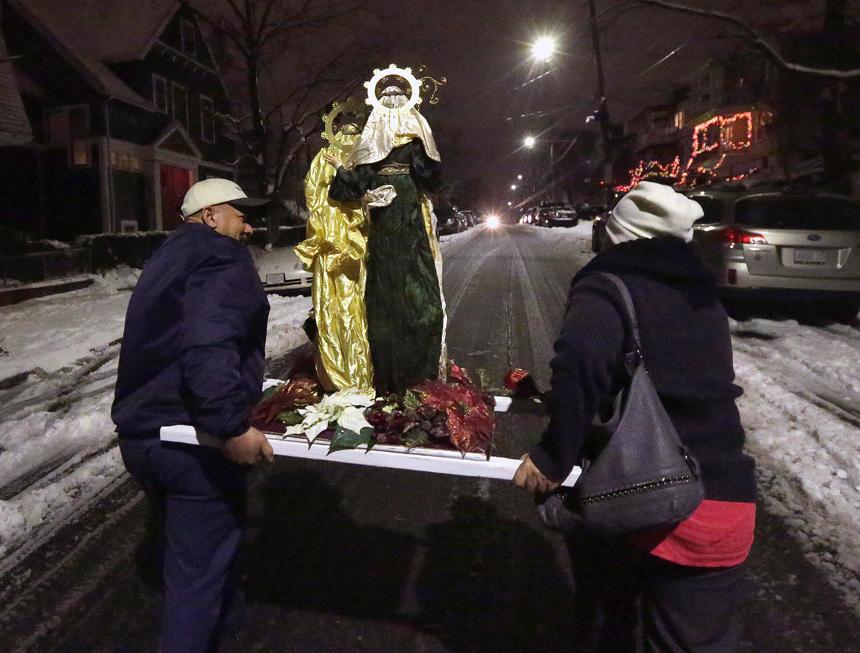
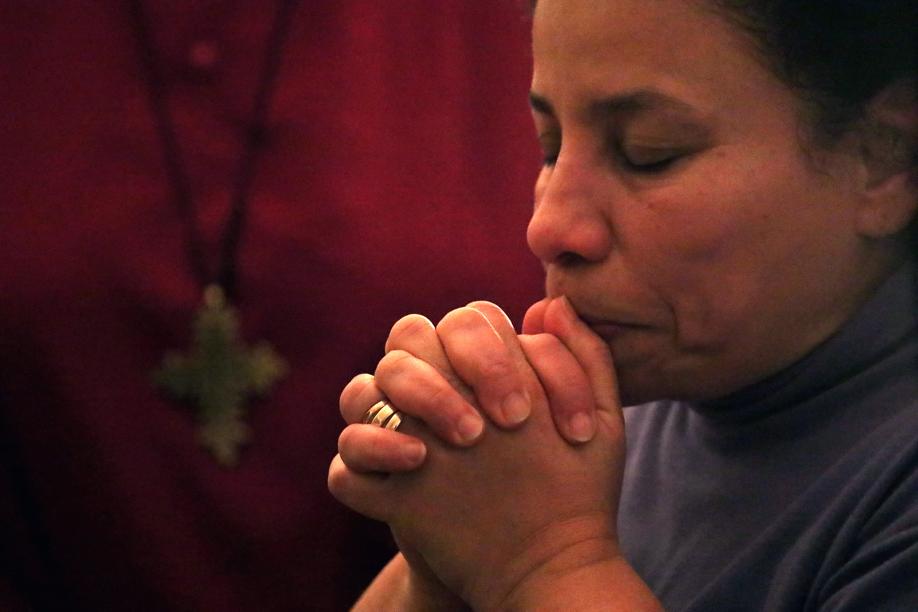
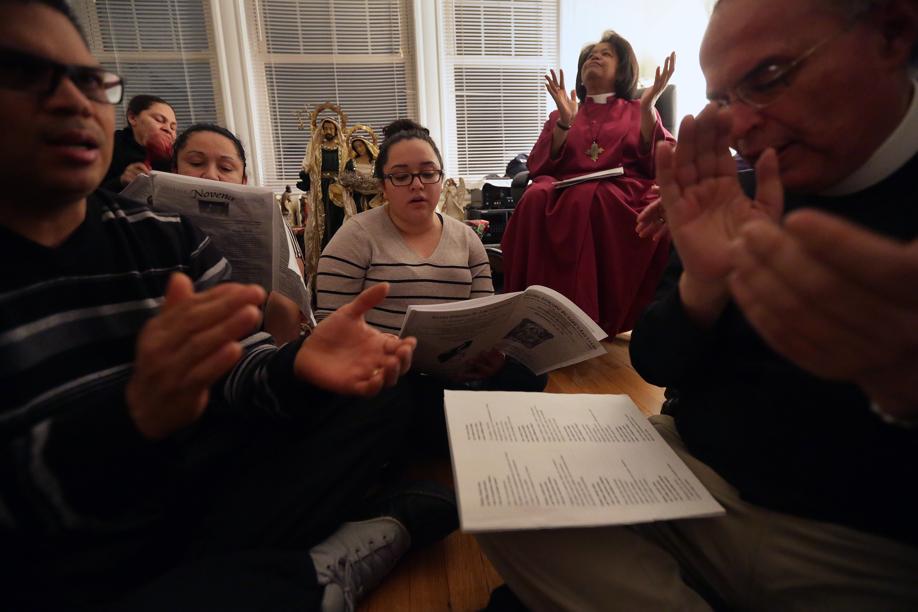
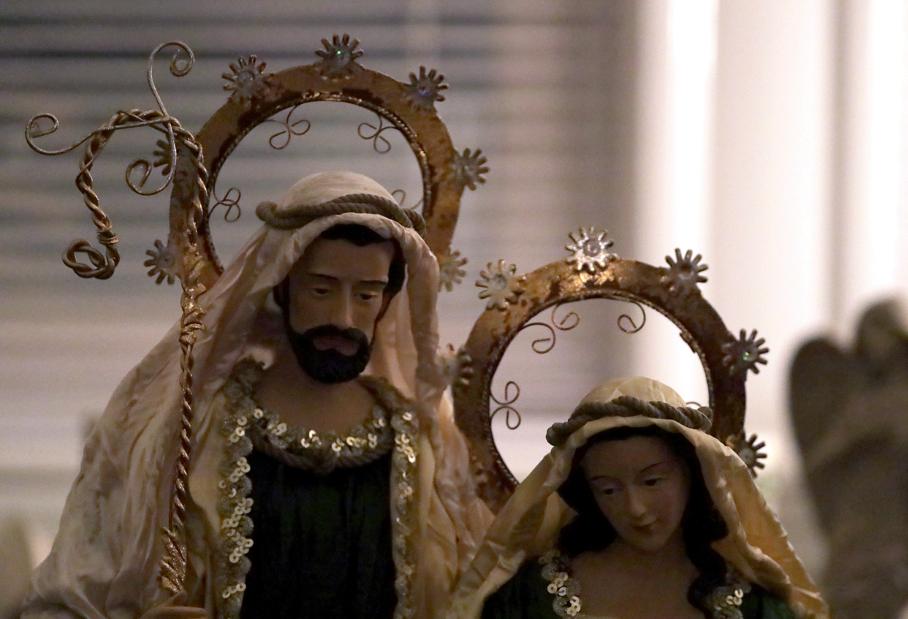
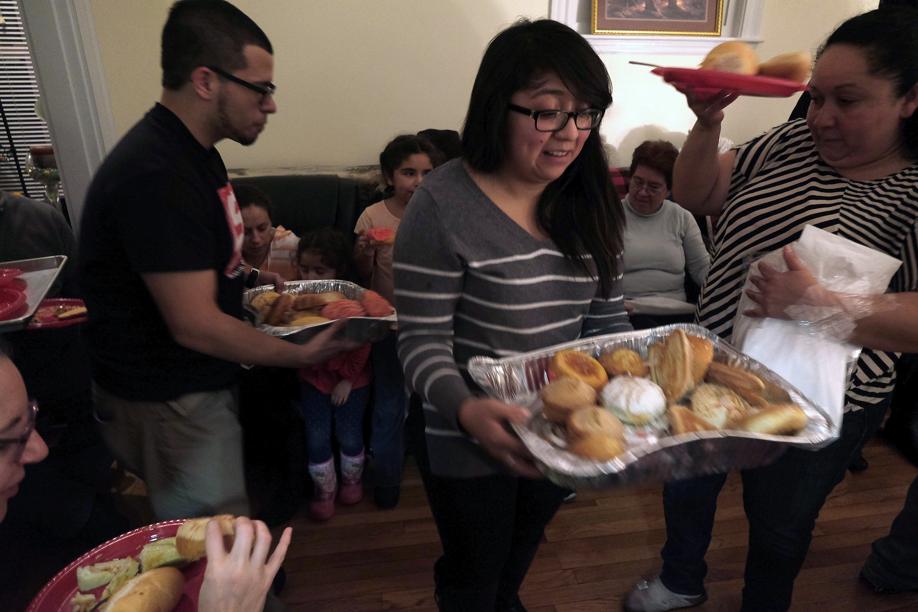
CHELSEA — This year, Christianity’s first story seems to mean even more.
Far from home, a lowly man and his pregnant wife are on a desperate search for a refuge, a place where the woman can give birth to a child who would change the world. They are viewed with hostility and suspicion until, finally, they find shelter in a stable.
For hundreds of years, Latino churches around the world have reenacted this quest on each of the nine nights before Christmas. The processions, called Las Posadas — The Inns — end with strangers finding the welcome Mary and Joseph did not, as honored guests in a parishioner’s home, where they gather to pray and sing and eat together.
On a Saturday night, members of San Lucas church in Chelsea, joined by those from other Episcopal churches in Westwood and Mattapan, trudged up a steep, snowy hill, holding each other to avoid slipping. At the head of the procession, statues of Mary and Joseph were held aloft.
They all crowded onto the front porch of the Castellon home, on Franklin Street.
“In the name of heaven, I ask you for shelter, For my wife is tired, She can go no farther,’’ they sang in Spanish.
“I am no inn-keeper. You two cannot stay here. He might be a scoundrel,’’ the Castellons sang back.
Back and forth they went, playing the parts of beseeching pilgrims and the skeptical hosts, until finally, the Castellons gave in, threw open the door, and the pilgrims filed in, up the stairs to the second-floor apartment.
The place was cozy, the smell of cooking tamales wafting through the living room. Irma Castellon had spent days making 200 of them for the night’s feast. The people prayed together, in Spanish and English, and sang hymns and carols.
It was warm and crowded, every seat and every spot on the floor taken. There have been more people at this year’s posadas than before, said Teresita Cetina, 62, who arrived here from Mexico 40 years ago. Because this year, people are more afraid, more in need of the reassurance that worshipping together provides.
“Everybody you talk to, they have that fear,’’ she said. “A lot of people are moving to the church because of what they’re hearing. . . . We see more people come, trying to believe that things are going to be better.’’
Better than the talk of deportations and walls, and the suspicion that surrounds Latino immigrants now. Though all they seek is refuge for their families, they know some see them as scoundrels. Edgar Gutiérrez-Duarte, the vicar at San Lucas, said there is great apprehension in his church, with children expressing fears their parents will be deported, and everyone feeling unwelcome in a country they’d considered theirs.
“My mom and dad were running away from poverty and civil war,’’ said Jacky Castellon, 23, a teacher who helped lead the prayers, and ferried tamales to guests. Her parents were born in El Salvador. “For me, this posada means more. We are fearful of what’s going to happen.’’
Jacky, her two sisters, and her brother are realizing their parent’s dreams: Born here, they are hard-working, devoted to their family and to the church, and dedicated to lives of service.
The parish has lost beloved members to deportation. Christmas reminds them of Livio Arias Torres, an activist and guitarist from Venezuela who played the carol “Mi burrito sabanero’’ (“My little donkey’’) with such gusto that church members couldn’t help but dance. Torres, then 70, was arrested by immigration authorities in 2012 and deported.
“He made our music so much more alive, and joyous,’’ Gutiérrez-Duarte said. “Imagine our grief when we had our first posada without him.’’
The church offers a unity and strength these people desperately need right now. The story of Christmas is in some ways their story. And in case that wasn’t utterly plain on this snowy night, Bishop Gayle E. Harris spelled it out.
“Jesus’ time and our time may be different, but they are also the same,’’ she said. “We are people of God, who want to have justice, and security, and a home. So let us always remember, as we may be forced to move, and we may have fear in our hearts, that Mary and Joseph had the same experiences we have. We are journeying with them, and them with us. And so we still have hope.’’
Though they are understandably fearful, hope was all around them in that crowded apartment, which was thrown open to dozens of strangers, and was full of singing and love and a determination to stand together no matter what may come.
“People don’t realize, there is a world of goodness,’’ Jacky Castellon said. “All these people who came to our house tonight, we don’t know them, but we welcome them, we respect them. We speak different languages, together. That’s what the posadas are about.’’
Winter will come. The unluckiest of those who sang together here will know a world grown colder, a world which turns away and closes the door. But here, in the days before Christmas, it was warm and safe. This was a night to be cherished.
“This is one moment where we don’t have to worry about anything,’’ Jacky Castellon said.
Yvonne Abraham is a Globe columnist. She can be reached at yvonne.abraham@ globe.com and on Twitter @GlobeAbraham



